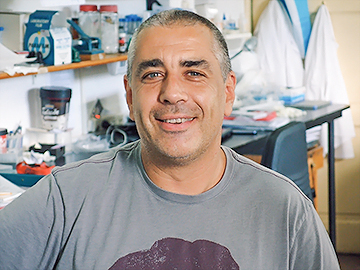Investigador Adjunto de CONICET / Profesor Adjunto UNC
Teléfono: +54 351 5353855 int. 3440
E-mail: ggil@fcq.unc.edu.ar
Tema de Investigación
Oxalate Induce Breast Cancer Tumor
Microcalcifications are routinely used to detect breast cancer in its early stages, these early detections gives for a better patient outcome. Mammary microcalcifications are mainly composed of calcium oxalate (OX) or calcium phosphate. Not enough research has been carried out directed to investigate the impact of the presence of OX has within the breast tumor microenvironment. In order to study the biological significance and implication of OX with the breast tumors, we measured the Ox concentration in both, Human Breast tumor tissues and adjoining non-pathological breast tissues. We found that all tested breast tumor tissues had greater concentration of Ox than the contrary non-pathological breast tissue. Moreover we found that Ox induced cell proliferation and IEG over-expression in MCF7 and MDAMB231 human breast cancer cells. Furthermore the exposure of breast epithelial cells to OX in a chronic way sets the stage for transformation from normal to fully developed breast tumors. Female mice were injected with OX periodically at the mammary fatpad or in the back during a month. Only the mice injected with OX solution at the mammary fat pad area generated tumors. Moreover we observe oxalate tissue specificity, this mean there should be something in the breast cells necessary to oxalate induces tumor’s formation, since no tumors were formed when oxalate was injected in the mice back, neither fibroblast cells proliferation was seen when oxalate was added to the culture medium. IEG were also found over-expressed in these tumors.
Breast Tumor Microenvironment Induces Tamoxifen Endocrine Resistant
The Epithelial mesenchimal transition (EMT) program depends on a series of intracellular signaling networks involving, among others signal-transduction proteins, ERK, MAPK, and PI3K.Previous to EMT, CD44low/CD24high cells correspond to the phenotype of the majority of cells found in breast carcinomas whereas a shift to CD44+/CD24- cells, promotes EMT and a profile associated with human breast cancer stem cells (CSC) leading to the acquisition of mesenchymal qualities and an increased ability to form mammospheres and increased metastatic potential.
Becarios Integrantes del Grupo
- M. Celeste Rodriguez. Becaria de CONICET.
- Ayelén Nigra. Becaria postdoctoral CONICET
Publicaciones Seleccionadas
- Castellaro A, Cejas H, Tonda A, Pucci O, Caputto BL, and Gil GA. Oxalates Microcalcifications Induce Breast Cancer-.Enviado (GG as corresponding author)
- Castellaro A , Nettles KW, Caputto BL and Gil GA . Breast Tumor Microenvironment Induces c-Fos Overexpression, Endocrine-Resistant and CSC Enrichment -.Enviado
- Caputto BL, Cardozo Gizzi AM, Gil GA. C-Fos: An AP-1 Transciption Factor With Additional Cytoplasmic, Non-Genomic Lipid Synthesis Activation Capacity. BIOCHIM BIOPHYS ACTA. 2014 MAY 30.
- Ferrero G.O., Renner M.L., Gil G.A., Rodriguez L. and Caputto B.L.. C-FOS-Activated Synthesis Of Nuclear Phosphatidyl Inositol-4,5- Changes. BIOCHEM J. 2014 MAY 13.
- Gil GA, Silvestre DC, Bussolino DF and Caputto BL. Controlling Cytoplasmic C-Fos Control Tumor Growth In The Peripheral And Central Nervous System. NEUROCHEM RESEARCH . MARCH-2012-
(Ver más publicaciones-CONICET)
Colaboraciones
- Oscar Pucci Hospital Nacional de Clinicas UNC.
- Hector Ferreyra Hospital Nacional de Clinicas UNC
Breve Currículum Vitae
Formación Académica
Doctor en Química. UNC-Facultad de Ciencias Químicas, Universidad Nacional de Córdoba. 2004. Topic: c-Fos regula la síntesis de Fosfolípidos, Director: Dr. B. Caputto.
Posiciones Pasadas
- 2008-2009. Staff Scientific The Scripps Research Institute (TSRI). T. Topic: ER and NFKB Pathways Director: Dr. Kendall Nettles.
- 2004-2006. Post-doctorado Cancer Institute of New Jersey/IAS PRINCETON. T. Topic: SNPs in p53 Pathways, Director: Dr. Arnold J. Levine.
Tesis Doctorales dirigidas
- Lic. Andres Castellaro inicio 2013. Micromediambiente tumoral-Cancer de Mama.
- Med. Horacio Escobar inicio 2015. CTC Celulas tumorales Circulantes: detección y pronostico



